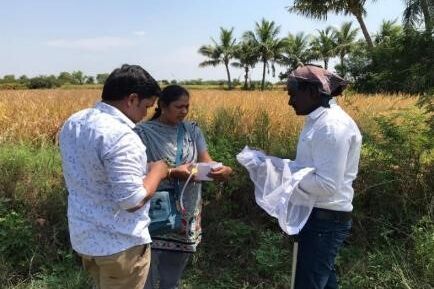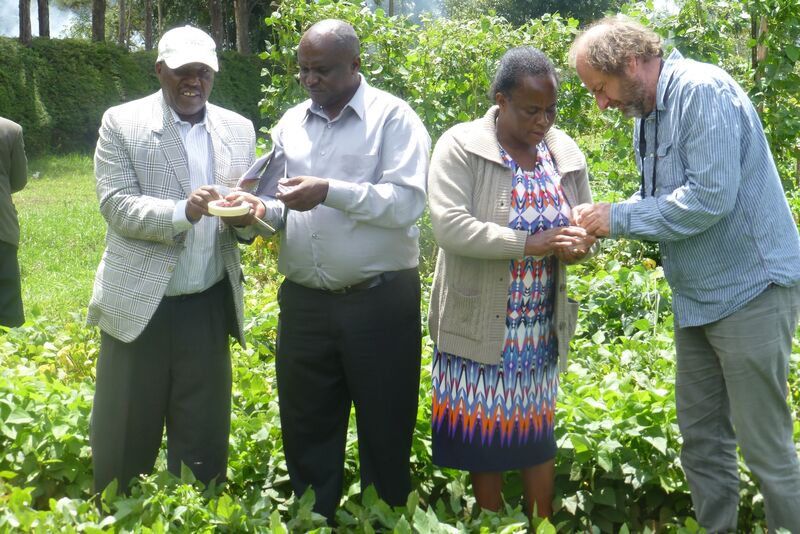
New foothold for integrated crop protection via CABI
Koppert has been working with CABI for a number of years. The impact of this? Knowledge about biological crop protection is starting to seep into smallholder farming communities in developing countries.
Plant doctors operate within the CABI Plantwise programme all over the world. ‘Growers come to the consultation hours of a plant doctor with a ‘sick’ maize plant on the back of their moped. The doctor makes the diagnosis: what is wrong with the plant and what can be done to improve the crop. Growers trust that expert. So you can imagine how important it is that he or she explains that there are natural, biological ways to control a disease or pest. That is why it is so important to train plant doctors in this matter. It must be remembered that nature is the best ally,’ explains Ed Moerman. He is executive manager of the Koppert Foundation.
‘Koppert wants to encourage many more farmers to work in a cleaner way, including smallholder farmers, where there is still relatively little knowledge about integrated crop protection.’
Noticeable effect
CABI has trained plant doctors in biological control methods in recent years. This was done with a contribution from the Koppert Foundation for curriculum development. In 2018, there was a pilot in Kenya in which 51 plant doctors were trained. Ed Moerman: ‘In the past, there was a lot of confidence in chemical crop protection. You apply it and see the effect the next day. Biological crop protection doesn’t show effect overnight. Yet, evaluation of the training after about one year showed effect. Plant doctors in this region, for example, advise less often on products that are harmful to natural enemies and they increasingly point growers to natural solutions that can be bought in the local shop.’
Expand to Burundi
CABI is now scaling up the training in the newest country to join Plantwise, Burundi. Willis Ochillo, Regional Manager for Plantwise in Africa: ‘Forty-five new plant doctors have been trained in Burundi and by 2023 there will be 300. Training in integrated pest management is a part of their education. What Koppert adds to CABI's knowledge is the focus on an integrated, sustainable way of working, which is also good for the health of the farmers themselves. Koppert also knows a lot about safe ways to apply crop protection products. Knowledge that small-scale farmers often lack and for which they do not have the right equipment.’
India: less chemistry
‘Twenty-eight of the plant doctors in India have also been trained. We adapted the training to the local conditions and the knowledge of diseases and pests in India,’ says Malvika Chaudhary, Regional Coordinator for Plantwise in Asia.
Ed Moerman adds: ‘In India we have also trained private advisers in addition to the plant doctors. The Indian government is leading the way to becoming less dependent on chemicals.’

All 13,000 doctors
CABI developed the training material with financial help and knowledge from Koppert. This has recently become available via the CABI Academy and has since been requested by 20 plant doctors who haven’t had the training, but do want to apply the knowledge.
Malvika Chaudhary: ‘We are eager to give all plant doctors this training, but with more than 13,000 worldwide, that is obviously not possible in a short time.’ Also, adapting the training to each country costs time and money. ‘In addition, in a country there must also be a desire from within to change. At the very least, a government should allow new biological agents, for example,’ Ed Moerman adds. ‘In that respect, the collaboration with CABI is useful. Not only has this organisation built up a huge database of knowledge of plant diseases and pests around the world for 110 years, CABI also has connections with governments of countries where commercial parties find it difficult to gain a foothold.’
Portal
CABI launched a new portal in 2021, the CABI Bio Protection Portal, in which advisors and growers can find an overview of all non-chemical commercial products that are legally registered and commercially available in their country.
‘Koppert has filled the database, but we are not the only ones. It is a complete overview of resources from all participating suppliers,’ says Ed Moerman. ‘The attention to smallholder farmers was the reason for us to market Trianum in smaller packaging in Kenya, among other places, so that our products are also within reach for smallholder farmers. Koppert Kenya has installed refrigerators in local stores to better preserve the natural products we supply. Our turnover from those small rural shops is growing. This knowledge portal is good for farmers and for us. Here merchant and pastor go hand in hand.’